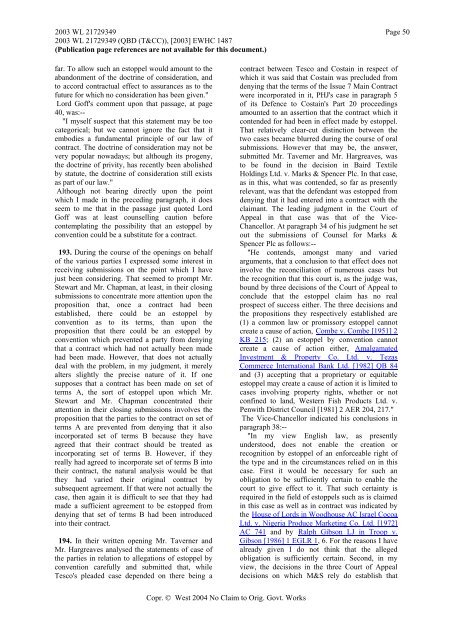Tesco v Constain - Thomson Reuters
Tesco v Constain - Thomson Reuters
Tesco v Constain - Thomson Reuters
Create successful ePaper yourself
Turn your PDF publications into a flip-book with our unique Google optimized e-Paper software.
2003 WL 21729349 Page 502003 WL 21729349 (QBD (T&CC)), [2003] EWHC 1487(Publication page references are not available for this document.)far. To allow such an estoppel would amount to theabandonment of the doctrine of consideration, andto accord contractual effect to assurances as to thefuture for which no consideration has been given."Lord Goff's comment upon that passage, at page40, was:--"I myself suspect that this statement may be toocategorical; but we cannot ignore the fact that itembodies a fundamental principle of our law ofcontract. The doctrine of consideration may not bevery popular nowadays; but although its progeny,the doctrine of privity, has recently been abolishedby statute, the doctrine of consideration still existsas part of our law."Although not bearing directly upon the pointwhich I made in the preceding paragraph, it doesseem to me that in the passage just quoted LordGoff was at least counselling caution beforecontemplating the possibility that an estoppel byconvention could be a substitute for a contract.193. During the course of the openings on behalfof the various parties I expressed some interest inreceiving submissions on the point which I havejust been considering. That seemed to prompt Mr.Stewart and Mr. Chapman, at least, in their closingsubmissions to concentrate more attention upon theproposition that, once a contract had beenestablished, there could be an estoppel byconvention as to its terms, than upon theproposition that there could be an estoppel byconvention which prevented a party from denyingthat a contract which had not actually been madehad been made. However, that does not actuallydeal with the problem, in my judgment, it merelyalters slightly the precise nature of it. If onesupposes that a contract has been made on set ofterms A, the sort of estoppel upon which Mr.Stewart and Mr. Chapman concentrated theirattention in their closing submissions involves theproposition that the parties to the contract on set ofterms A are prevented from denying that it alsoincorporated set of terms B because they haveagreed that their contract should be treated asincorporating set of terms B. However, if theyreally had agreed to incorporate set of terms B intotheir contract, the natural analysis would be thatthey had varied their original contract bysubsequent agreement. If that were not actually thecase, then again it is difficult to see that they hadmade a sufficient agreement to be estopped fromdenying that set of terms B had been introducedinto their contract.194. In their written opening Mr. Taverner andMr. Hargreaves analysed the statements of case ofthe parties in relation to allegations of estoppel byconvention carefully and submitted that, while<strong>Tesco</strong>'s pleaded case depended on there being acontract between <strong>Tesco</strong> and Costain in respect ofwhich it was said that Costain was precluded fromdenying that the terms of the Issue 7 Main Contractwere incorporated in it, PHJ's case in paragraph 5of its Defence to Costain's Part 20 proceedingsamounted to an assertion that the contract which itcontended for had been in effect made by estoppel.That relatively clear-cut distinction between thetwo cases became blurred during the course of oralsubmissions. However that may be, the answer,submitted Mr. Taverner and Mr. Hargreaves, wasto be found in the decision in Baird TextileHoldings Ltd. v. Marks & Spencer Plc. In that case,as in this, what was contended, so far as presentlyrelevant, was that the defendant was estopped fromdenying that it had entered into a contract with theclaimant. The leading judgment in the Court ofAppeal in that case was that of the Vice-Chancellor. At paragraph 34 of his judgment he setout the submissions of Counsel for Marks &Spencer Plc as follows:--"He contends, amongst many and variedarguments, that a conclusion to that effect does notinvolve the reconciliation of numerous cases butthe recognition that this court is, as the judge was,bound by three decisions of the Court of Appeal toconclude that the estoppel claim has no realprospect of success either. The three decisions andthe propositions they respectively established are(1) a common law or promissory estoppel cannotcreate a cause of action, HCombe v. Combe [1951] 2KB 215; (2) an estoppel by convention cannotcreate a cause of action either, HAmalgamatedInvestment & Property Co. Ltd. v. TezasCommerce International Bank Ltd. [1982] QB 84and (3) accepting that a proprietary or equitableestoppel may create a cause of action it is limited tocases involving property rights, whether or notconfined to land, Western Fish Products Ltd. v.Penwith District Council [1981] 2 AER 204, 217."The Vice-Chancellor indicated his conclusions inparagraph 38:--"In my view English law, as presentlyunderstood, does not enable the creation orrecognition by estoppel of an enforceable right ofthe type and in the circumstances relied on in thiscase. First it would be necessary for such anobligation to be sufficiently certain to enable thecourt to give effect to it. That such certainty isrequired in the field of estoppels such as is claimedin this case as well as in contract was indicated bythe House of Lords in Woodhouse AC Israel CocoaLtd. v. Nigeria Produce Marketing Co. Ltd. [1972]AC 741 and by HRalph Gibson LJ in Troop v.Gibson [1986] 1 EGLR 1, 6. For the reasons I havealready given I do not think that the allegedobligation is sufficiently certain. Second, in myview, the decisions in the three Court of Appealdecisions on which M&S rely do establish thatCopr. © West 2004 No Claim to Orig. Govt. Works
















